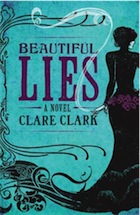 Clare Clark has a well-deserved reputation for creating atmosphere. Her first novel, The Great Stink, was an evocative mélange of madness and mire, set in the London sewers in the 1860s. My favourite, The Nature of Monsters, encompassed more madness, as well as contemporary science and myth. These books are dense and rich, with sentences that are so lush, so beautifully finished, that one almost wants to stroke her prose.With her latest novel, however, Clark has changed gear. She has moved closer to us in time – Beautiful Lies takes place in 1887, the year of Queen Victoria’s golden jubilee. She is also closer to us in feel: Clark depicts an age of corrupt newspaper practices, sex scandals, riots, looting, homelessness, unemployment and, most of all, a growing divide between haves and have-nots. Two encampments in London are obsessing the country: the homeless and the unemployed – the starving – are gathering in Trafalgar Square; four miles away, in Earl’s Court, “Buffalo Bill” Cody’s Wild West Show, newly arrived from the US, is also provoking plenty of newspaper coverage. And moving between them is Maria Isabel Constanza de la Flamandière Campbell Lowe, known as Maribel, the cigarette-smoking photographer wife of a Scottish radical MP.
Clare Clark has a well-deserved reputation for creating atmosphere. Her first novel, The Great Stink, was an evocative mélange of madness and mire, set in the London sewers in the 1860s. My favourite, The Nature of Monsters, encompassed more madness, as well as contemporary science and myth. These books are dense and rich, with sentences that are so lush, so beautifully finished, that one almost wants to stroke her prose.With her latest novel, however, Clark has changed gear. She has moved closer to us in time – Beautiful Lies takes place in 1887, the year of Queen Victoria’s golden jubilee. She is also closer to us in feel: Clark depicts an age of corrupt newspaper practices, sex scandals, riots, looting, homelessness, unemployment and, most of all, a growing divide between haves and have-nots. Two encampments in London are obsessing the country: the homeless and the unemployed – the starving – are gathering in Trafalgar Square; four miles away, in Earl’s Court, “Buffalo Bill” Cody’s Wild West Show, newly arrived from the US, is also provoking plenty of newspaper coverage. And moving between them is Maria Isabel Constanza de la Flamandière Campbell Lowe, known as Maribel, the cigarette-smoking photographer wife of a Scottish radical MP.
Maribel is half-Chilean, half-French, and met her husband while she was at school in Paris, when his horse reared in front of her. At least, that’s the story they tell, but as we follow Maribel through the long, hot summer, it becomes clear that her story is more complicated and much darker. The question is, does the crusading newspaper editor Webster know it too? And can he blackmail her to get at her husband, his sometime ally, sometime opponent?
Clark is interested less in Maribel’s story and more in the knife-thin line that separates memory from truth: if we really believe in the former, does it become the latter? Fascinating though such questions are in themselves, they encourage many of her narrative threads to trail away unresolved because the interiority of her characters matters more to her. For instance, a subplot involving one of Cody’s Native Americans is given two whole chapters. But then, when he has served his technical function, which is to link Maribel with another character, he vanishes from the story, even though Clark has made us want to know what becomes of him. The power of memory triumphs over the power of narrative, not always to the reader’s benefit.
One wonders if the book was perhaps written too quickly. Clark has a talent for an unusual metaphor – on the very first page, “a dark figure leaked into the room”, and stands “as silent as syrup”. Yet here she permits her characters to do something as inexpressive as “make a face” twice in two pages, or to misuse the word “blandishment”. But ultimately what remains with the reader are Clark’s ideas of stories, and story-tellers. Another photographer rejects Maribel’s concern for one of her sitters. Who he really is, what he feels, he says, is “immaterial. What matters is … the moment you have created, the boy you have made. This boy belongs to all of us. We are each free to tell his story in whichever way we choose.” It is not hard to believe Clark is speaking for herself, and for the power of fiction. She too has created such a moment, a London filled with the hungry and defiant, the rich and self-absorbed, and the many in between, which now belongs to us all.